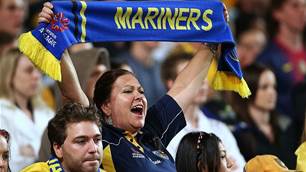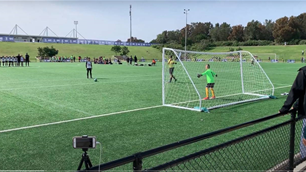Should match commentators stop acting like fans ?
Most people who watch football are armchair commentators. Whether at the game, in the pub or lazing on the couch, half the fun is loudly sharing our opinions on the game. As fans we are necessarily and often proudly biased, revelling in snide remarks and blind prejudice. Sure, it’s highly entertaining - but shouldn’t real match commentary rise above all that?
Last weekend, for example, I had a great time at Bluetongue watching the Mariners play Glory. No-one would describe it as the greatest advertisement for The Beautiful Game but from a fan’s perspective it gave me many reasons to feel good. Bernie started and brought an amazing spark onto the pitch. Wilko was back valiantly nursing his wonky arm and raising the team’s performance through his almost magical presence at the back. Matty scored and McBreen brought creativity to his role as number 10. But most importantly – we WON! We won at last! There was light at the end of the tunnel!
But my good vibes were soon crushed when I made the mistake of watching the replay the following day and heard this comment as the second-half started :
“It’s funny, last season it was Glory who were accused of dragging teams down to their level in the struggle for points, this season it’s the Mariners.”
Huh ? ! I thought we’d just watched the Mariners come back from 1-0 down to take the lead over an undefeated team. Perhaps I was imagining things. Perhaps I also imagined that we managed to keep them at bay for the whole second half in tough conditions, a win later described by Simon Hill as “unconvincing”. Gee, Perth looked pretty convinced they’d lost and so did their coach.
So here we go again : let’s roll out the “ugly Mariners grinding out a win” tag, as if last year were just some kind of aberration. Let’s harp on about Matt Simon’s handball just to add to the negativity (conveniently forgetting Perth’s handball which unlike Matt’s, gave them a goal-scoring opportunity). Or here’s a better idea, why not look at the facts : Fouls – CCM 14 Perth 15. Cards - CCM 4 Perth 3. Tells a different story, but not so sensational.
You don’t need a degree in media studies to understand that football commentators can shape public perceptions of teams, players, referees and sometimes even fans. What they say (and sometimes more importantly what they don’t say) especially when repeated week after week or season after season can create both positive and negative images for those teams and players involved. In turn, these perceptions can be picked up by the mainstream media which looks to football experts for cues.
In a bigger league, such as the EPL, negative public perceptions are simply water off a rich duck’s back. But this is a small and newly-formed league where many clubs are desperate to create and maintain a positive image. Negative public perceptions may have a real effect on attendances and sponsorship dollars.
Like it or not, football commentators are authority figures whose comments can subtly support or undermine teams, even if unintentional. There’s damning with faint praise (“They were lucky to win!”), building up a team even in defeat (“Well, they were very unlucky to lose that one!”) or my personal favourite, the team that “fought back to get an equaliser” (an inferior team gets a late goal-scoring opportunity due to a refereeing error).
But maybe I’m being hypocritical here. Who doesn’t love to hear a green and gold tinged enthusiasm infecting commentators when the Socceroos or the Matildas play ? To be unbiased under those circumstances would simply be un-Australian. And likewise I have a soft spot for the “supportive” commentary from Harry and Fred at The Cake Tin because it’s often so entertaining.
The last thing I’d want to do is sanitise match commentary because I enjoy the stupid jokes and opinions. But commentators are not fans. As “experts” we should expect them, above all, to provide a disinterested perspective on the game. Otherwise we might as well just turn the sound off and do the biased commentary ourselves.
Related Articles

Revealed: New buyer’s pitch to reinvigorate A-League's Mariners

Fresh talent flock to ambitious A-League outfit's pro pathway













